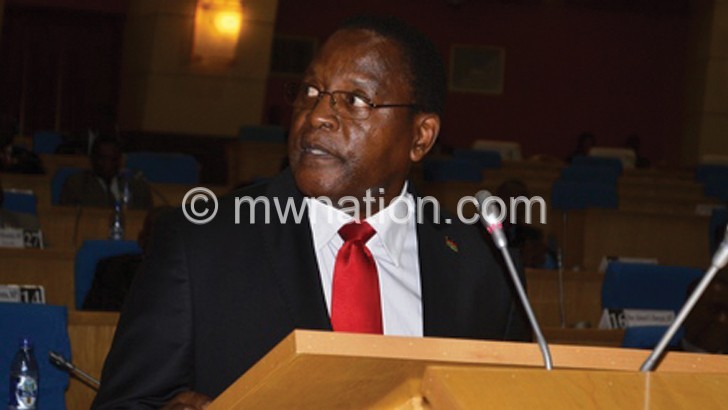‘APM’s speech empty’
President Peter Mutharika yesterday gave what sounded like a wish list of the projects his government intends to carry out during the 2016/17 fiscal year and failed to explain how government will raise money to implement them.
For the first time, President Peter Mutharika also revealed that the much-touted K600 million Kam’mwamba Coal Fired Power Project will be funded by a loan from the Exim Bank of India.

All along, government has given the impression that this project would be fully-funded by China as a grant. Given the abuse of $156 million Malawi borrowed from the Exim Bank between 2008 and 2014, economic commentators warn that there is a risk that this project will never be completed, while Malawians will be left with the burden of paying back the loan.
Speaking when he delivered the State-of- the-National-Address (Sona) yesterday Mutharika, however, said that government will ensure that foreign loans are obtained primarily to finance development projects that are thoroughly appraised and are of strategic importance to the country. He stressed that projects must be justified to be of high rate of return.
In his immediate comment to the Sona, leader of opposition in the House Lazarus Chakwera said there was no substance in the speech because the Mutharika outlined issues which Malawians already know.
Said Chakwera: “As a Malawian, I expected the president to give a clear direction on what government would do in the next 12 months to address the challenges the country is facing.’’
He said the president should have outlined a strategic approach for tackling the challenges such as hunger and the ailing economy.
Chakwera, however, said he will use the next two months Parliament would be meeting to demand answers on how money Malawians pay as taxes has been used, and how government has spent the 2015/16 approved budget.
Other commentators, however, said that the main problem has always been failure to audit and account for the loans once they are taken, and failure to give sufficient justification at the time of borrowing.
Mutharika’s speech gave updates on all sectors of the Malawi economy.
Among other highlights, Mutharika said the terminal building of the Kamuzu International Airport in Lilongwe will be refurbished, while Chileka will have a new airport.
Mutharika also said that the feasibility study of the Shire-Zambezi Waterway has been completed, and the river system has been found navigable. He said that further meetings were in the pipeline to map the way forward.
However, when it came to national security, Mutharika’s speech failed to propose a robust solution for protecting people with the albinism. Fourteen people with albinism have been killed since December 2014, eliciting an outcry locally and internationally.
With regard to corruption, Mutharika vowed to pursue cases pertaining to the K20 billion Cashgate scandal that occurred during the former president Joyce Banda’s rule, but he avoided mentioning the K577 billion plunder of resources as revealed by Pricewaterhouce Coopers (PwC) audit report that spans his brother, the late Bingu wa Mutharika’s tenure up to 2014.
Mutharika also avoided any mention of the K300 million plunder of funds at Ministry of Foreign Affairs, using Ethiopian Embassy as a conduit.
Mutharika also touted the imminent review of the National Anti-Corruption Strategy, although commentators, including members of the diplomatic corps and opposition parties, agree that the independence of the ACB is key to ensuring a meaningful fight against corruption.
Turning to disaster recovery, Mutharika said that Malawi has so far sourced K53 billion for disaster recovery, but which is only 30 percent of the required K169 billion required for the programme. The President added that, among other things, this money was used to procure 33 000 metric tonnes of maize for stocking in the Strategic Grain Reserve.
On agriculture, the President said that the Farm Input Subsidy Programme (Fisp) will undergo further reforms to ensure that the programme is efficiently and effectively implemented.
“In the end, Fisp must be run like in the private sector,” said Mutharika. He did not elaborate.
In the information sector, Mutharika said the Access to Information (ATI) Bill has already been submitted to Parliament. However, Mutharika did not address concerns the media has against the watering down of the ATI Bill, which, if passed, will significantly reduce the importance of bill.
In the energy sector, the President reiterated what he has already said publicly before that the Electricity Supply Corporation of Malawi (Escom) will be split into two: transmission and distribution. n





